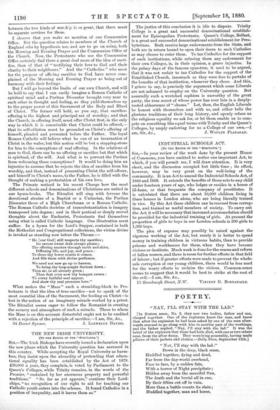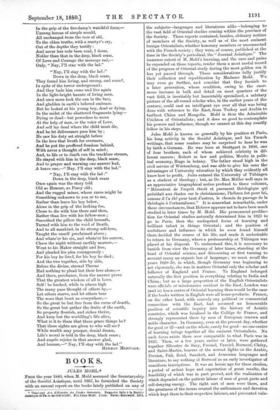POETRY.
"NAY, I'LL STAY WITH THE LAD."
[In Hutton seam, No. 3, they saw two bodies, father and son, clasped together. One of the explorers knew the man, and knew that after the explosion he had been asked by one of the men after- wards rescued to go along with him to another part of the workings, and the father replied, "Nay, I'll stay with the lad." It was the belief of the explorers that these had both died, with one or two others near, from the after. damp. They were lying peaceably, having made pillows of their jackets and clothes.—Daily News, September llth.] "NAY, stay with the lad :"
Down in the deep, black seam, Huddled together, dying and dead, Far from the day-world overhead, Face to face, by a sudden fate, With a horror of Night precipitate ; Hidden away from the merciful Sun, The death and the burial all in one,
By their fifties cut off in vain, More than a battle counts its slain ; Huddled together, man and horse, In the grip of the fire-damp's watchful force,—
Unsung heroes of simple mould, All unchanged from the race of old, To the olden truths, with a martyr's cry, Out of the depths they testify And never has rede been read, I deem, Nobler than that in the deep, black seam,
Of Love and Courage the message sad,—
Only, "Nay, I'll stay with the lad."
"Nay, I'll stay with the lad :" Down in the deep, black seam, They found him living, and strong, and sound, In spite of the terror underground ; And they bade him come and live again In the light-bright haunts of living men, And once more look the sun in the face, And gladden in earth's beloved embrace.
But he looked at his young boy, dead or dying,
In the midst of the shattered fragments lying—
Dying or dead—but powerless to move At the help of man, or the voice of Love.
And self lay dead where the child must die,
And he let deliverance pass him by ;
He saw his duty set straight before In the love that liveth for evermore, And he put the proffered freedom behind, With never a thought of self in mind ; And, to life or to death run the trackless stream, He stayed with him in the deep, black seam, And to prayer and warning one answer had, A brave one,—" Nay, I'll stay with the lad."
"Nay, I'll stay with the lad :"
Down in the deep, black seam Once again was the story told Old as Honour, as Poesy old; And the rugged miner, whose cares might be Something unknown to you or to me, Rather than leave his boy below,
Alone in the grip of the lurking foe,
Chose to die with him there and then, Rather than live with his fellow-men ; Smoothed the pillow the child beneath, Turned with him to the void of Death, And to all mankind, in its strong self-love, Taught the unself proclaimed above ; And whate'er his sin, and whate'er his sorrow,
Chose the night without earthly morrow,—
Went to his Maker straight and free, And pleaded his plea courageously : For his boy he lived, for his boy he died ; And the two together, side by side, Before the divine, eternal Throne
Had nothing to plead but their love alone,—
And there, perchance, from the answer prove That the greatest wisdom of all is Love.
Self ! be hushed, while in places high
The many pass thought of others by,—
Let others starve, and let others bear
The woes that beset us everywhere,—
So the great be but free from the curse of dearth, So the great but gather the fruits of the earth, So property flourish, and riches thrive, And keep but the worldling's life alive, What is it to them that these grave things be P That these sights are given to who will see ?
While wealth may prosper, denial dream, Life's moral is told in the deep, black seam ; And angels rejoice in that answer glad, And human,—" Nay, I'll stay with the lad."
HERMAN MERIVALE.



































 Previous page
Previous page